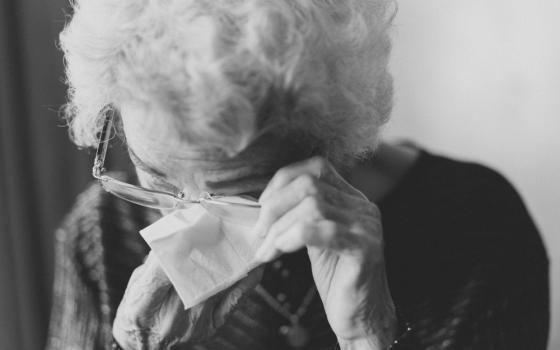"Many people are talking about the poor, but very few people talk to the poor." -- Mother Teresa
I eat a sloppy joe in the community kitchen with my classmate Morrie, bishop of Paris, Kan., then follow him around as he talks with his 36 guests.
Morrie sneaks up behind a little girl sitting at big round table with her mother and squeezes her shoulders. The girl startles and holds back a smile. "I know who you are, Father!"
"How do you solve a problem like Maria?" Morrie sings badly. "She climbs a tree and scrapes her knee and waltzes on her way to Mass and dooby dooby doo, what are we gonna do?"
"Maybe we give her to you, Padre," says her mother. "She can work for the church and the sisters look after her."
"Noo-oo," Maria says.
"I don't blame you," Morrie says.
"Are you helping out today, Norma?" he asks her mom.
"Sí. I help Jane stock the bookshelves today. Then I go help my lady."
"Norma is a caregiver," Morrie tells me. "She works two jobs, taking care of old people. She volunteers here when she can."
"Father," the girl says, "I bought something today."
"Brought," her mother says. "You brought something today."
"Wonderful. What is it?"
"You won't laugh?
"Only if you do."
Maria holds up a soft blue blanket. "My blankie," she says. "I don't need it anymore. Someone else can have it."
"She slept with it four years," Norma says. "Never let it go. It makes her feel safe."
"Now it can make someone else safe," Maria says.
"Maria, this is a wonderful gift. May I give you a hug? OK with you, Norma?" Both Maria and Norma get up.
"Do you know that people need three hugs a day just to survive, six to be healthy, and 12 to grow strong? Did I introduce you two to my friend Mike?"
"I know," Norma says as if she's done this gig many times before. "Group hug!"
The four of us group hug, our foreheads touching. "Hold it 10 seconds," Morrie says. "All your stress will disappear."
Ten seconds later, I feel like I had a 10-minute massage.
We bid adieu to Norma and Maria. In the next hour, Morrie spends time with all the guests in the room. He smiles at every one of them. He hugs more than a few and whispers to one of them to call Marge for an appointment to talk about it some more.
My back hurts and I sit down while Morrie continues to work the room. The homeless, those down on their luck, and families just getting by eat together with diocesan staff at tables with white tablecloths and ceramic dishes. The room is as big as a basketball court. Soon after he became bishop of Paris in 1998, Morrie converted this once abandoned meatpacking plant into a Diocesan Center. Most of the building still smells of sheep, but the kitchen is fresher than an empty bottle of Lysol. The two floors above have living quarters, and offices for two priests, three sisters, and seven laypeople who help Morrie run the second smallest diocese in the U.S. He likes to brag that before he got here Paris was the first smallest.
A plaque on the stone wall next to the doorway of the center reads:
"The bread in your box belongs to the hungry. The cloak in your closet belongs to the naked. The shoes you do not wear belong to the barefoot. The money in your vault belongs to the destitute."
-- St. Basil the Great
The first-floor kitchen is open five days a week, from 10:30 a.m. to 12:30 p.m. Volunteers cook and serve the meals. The guests are also welcome to take home canned goods or baked bread from the bookshelves along one wall, plus cartons of milk in three packinghouse fridges, and clothes, shoes or toys neatly arranged on folding tables at the far end. The guests, aware of their blessings -- and no doubt the words of St. Basil, which is also the name of the tiny basilica on the edge of the prairie -- bring goods and gifts themselves whenever they can. That, I guess, is why Maria brought her blankie for someone else to feel safe.
The last guests leave and Morrie pulls up a chair next to mine. "Want a Coke?" he asks.
"No, but you look like you could use one."
"I'm good."
"You know," I tell him. "This is really awesome. Do a lot of dioceses have soup kitchens like this?"
"I like to call it a community kitchen. It's not about the soup."
"I did some research before I flew out here. I read that 50 million Americans, mostly the working poor, have a hard time putting food on the table. Do you think the church could do more?"
"I don't think about that."
We sit in silence for a while. Then Morrie says, "Let's go up to my room for a Coke."
As we lumber by the tables with clothes and shoes and toys, I ask him, "How do you know people won't take stuff they don't need?"
"Honor."
"Does it happen though?"
"It doesn't matter. It's not about the stuff."
"What is it about then?"
Morrie smiles at me.
[Michael Leach shepherds Soul Seeing for NCR and edits books for Orbis Books.]
